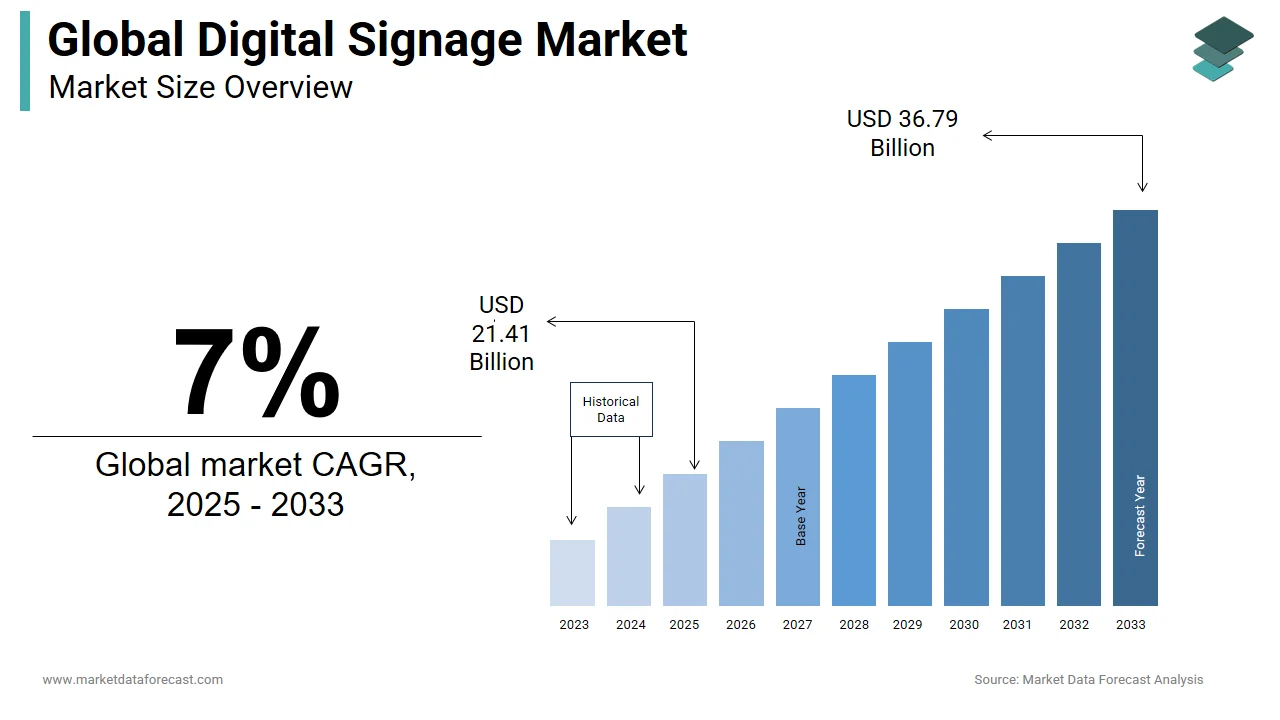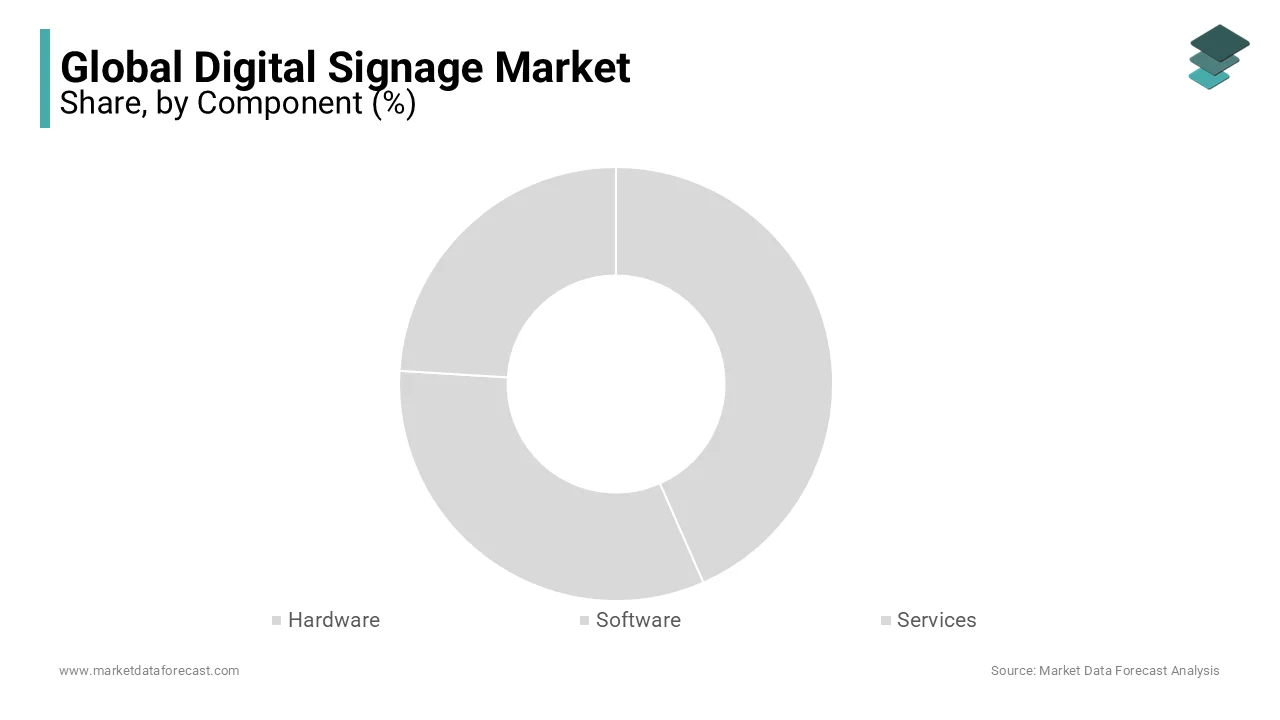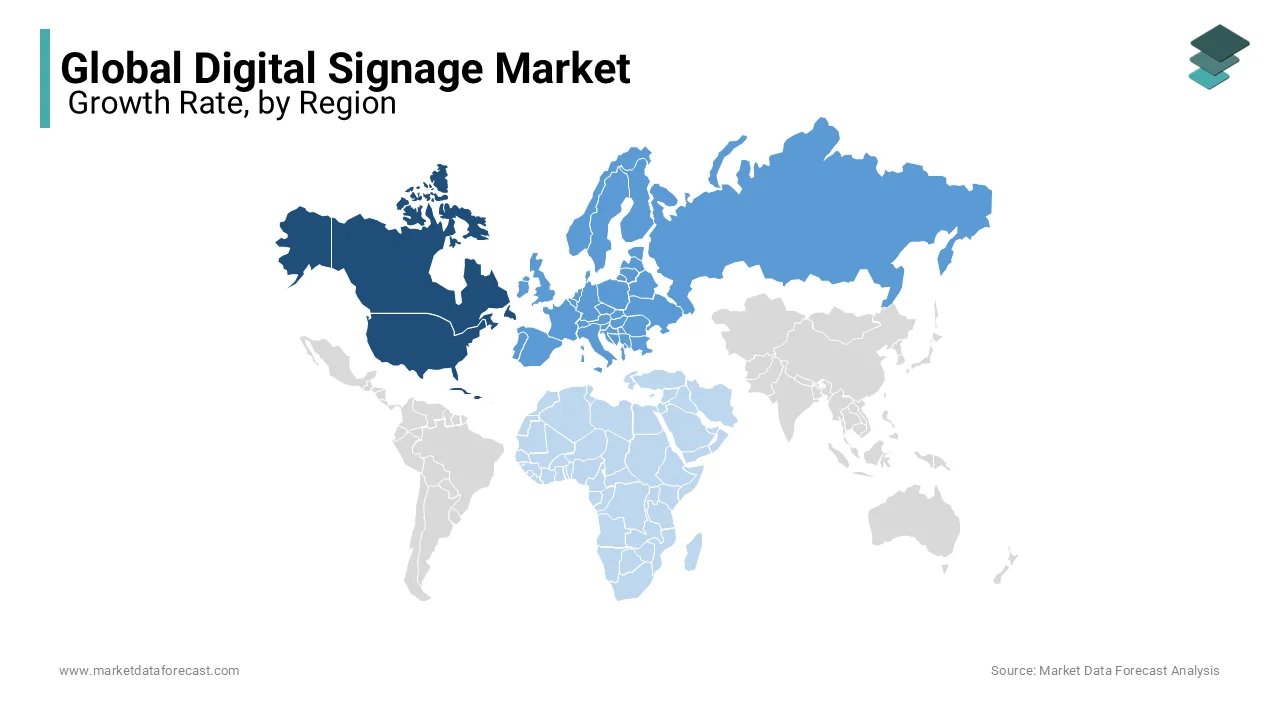Global Digital Signage Market Size, Share, Trends, & Growth Forecast Report – Segmented By Component (Hardware, Software, Services), End-user (Retail, Healthcare, Transportation, Education, Corporate), Application (Advertising, Informational, Entertainment), & Region - Industry Forecast From 2024 to 2032
Global Digital Signage Market Size (2024 to 2032)
The digital signage market, worth USD 18.70 billion in 2023, is expected to grow significantly. Forecasts indicate a CAGR of 7% between 2024 and 2032, with the market size projected to reach USD 20.01 billion in 2024 and USD 34.38 billion by 2032.

Digital signage is a display technology using electronic screens or monitors to showcase multimedia content such as videos, images, text, or live data in various settings. These digital displays are often interconnected through a network and allow dynamic and remote content management, enabling real-time updates and targeted information delivery. Digital signage finds applications in advertising, information dissemination, wayfinding, entertainment, and communication across diverse environments like retail stores, transportation hubs, corporate offices, educational institutions, and public spaces. It also serves as a versatile communication tool and customizable and interactive content to engage audiences.
MARKET DRIVERS
Technological advancements have had a transformative impact on the growth of the digital signage market, particularly in display technologies.
The evolution of high-resolution screens, LED displays, and interactive touchscreens has significantly enhanced the quality and versatility of digital signage solutions. This progress has captivated growth across diverse industries, prompting increased interest and substantial investments. The adoption of these advanced displays has not only elevated the visual appeal of digital signage but also expanded its applications, ranging from dynamic advertising in retail to interactive informational displays in corporate settings. As businesses increasingly recognize the value of these innovations in engaging audiences and conveying information, the demand for the digital signage market is poised for further expansion, with technology playing a pivotal role in shaping its trajectory.
MARKET RESTRAINTS
High initial costs act as a significant restraint in the demand for digital signage. The implementation of digital signage systems involves substantial upfront expenditures encompassing hardware, software, and installation. This financial barrier poses a formidable challenge for smaller businesses and organizations operating within constrained budgets. The capital-intensive nature of entry into the digital signage market sphere can limit the accessibility of these innovative solutions for businesses seeking to enhance communication and engagement. As a result, while larger enterprises may readily invest in cutting-edge digital signage technologies, smaller entities may find it economically burdensome to adopt these systems.
REPORT COVERAGE
|
REPORT METRIC |
DETAILS |
|
Market Size Available |
2023 to 2032 |
|
Base Year |
2023 |
|
Forecast Period |
2024 to 2032 |
|
CAGR |
7% |
|
Segments Covered |
By Component, End-User, Application, And Region |
|
Various Analyses Covered |
Global, Regional & Country Level Analysis, Segment-Level Analysis, DROC, PESTLE Analysis, Porter’s Five Forces Analysis, Competitive Landscape, Analyst Overview on Investment Opportunities |
|
Regions Covered |
North America, Europe, APAC, Latin America, Middle East & Africa |
|
Market Leaders Profiled |
Samsung Electronics, LG Electronics, NEC Display Solutions, Sharp Corporation, Sony Corporation, Panasonic Corporation, Planar Systems, Barco, Daktronics, Christie Digital Systems, ViewSonic Corporation, E Ink Holdings, BenQ Corporation, AU Optronics, Toshiba Corporation, Adflow Networks, Scala Inc., Innolux Corporation, Enplug, and others. |
SEGMENTAL ANALYSIS
Global Digital Signage Market Analysis By Component

Hardware is a dominating component in digital signage as it is attributed to its direct impact on the visual output and effectiveness of digital signage. Advances in display technologies, such as high-resolution screens and durable LED displays, contribute to digital signage solutions' visual appeal and versatility. As businesses seek to deploy eye-catching and engaging displays, the demand for cutting-edge hardware remains high.
Software holds the second largest share in the digital signage market demand and is a critical component that enables the management, scheduling, and presentation of content on digital signage displays. Content management systems (CMS), scheduling software, and other applications fall under this category. However, software lies in its ability to control and customize the content being displayed.
Services are the third dominating component in the growth of the digital signage market. These include installation, maintenance, and support provided by vendors. These services are crucial for ensuring the smooth operation and longevity of digital signage deployments. As the digital signage market matures, the importance of services is growing.
Global Digital Signage Market Analysis By End-User
Retail is often considered one of the most dominant end-users in the growth of the digital signage market. Digital signage is extensively utilized in retail environments for advertising, brand promotion, and enhancing the overall shopping experience. Retailers leverage digital signage to engage customers, display product information, and deliver targeted promotions. The dynamic and visually appealing nature of digital displays in retail settings contributes to their effectiveness in capturing consumer attention.
Healthcare is significant and holds the second-largest market share for digital signage applications. Digital signage is used in healthcare facilities for patient communication, wayfinding, and information dissemination. In healthcare settings, digital signage helps improve communication with patients, streamline operations, and enhance the overall patient experience.
Transportation is the third dominating end-user in the digital signage market. Real-time information displays, advertising, and wayfinding solutions are commonly implemented. Digital signage in transportation facilitates efficient communication with travelers, providing up-to-date information on schedules, directions, and promotional content.
Global Digital Signage Market Analysis By Application
Advertising is the most dominant segment in the growth of the digital signage market. Businesses across various industries leverage digital displays for dynamic and targeted advertising campaigns. The visual impact and flexibility of digital signage make it a powerful tool for advertising. Retailers, transportation hubs, and public spaces use digital displays to capture attention, promote products, and deliver promotional content dynamically and engagingly.
Informational applications are second in dominating the market share as they are widespread and utilized in settings such as corporate offices, healthcare facilities, and educational institutions. Digital signage serves to convey important information, announcements, and wayfinding details. The ability to provide real-time updates, event schedules, and other relevant information makes informational digital signage crucial in enhancing communication within various environments.
Entertainment plays a pivotal role in the Digital signage market as it is employed for event promotion, wayfinding, and creating immersive visitor experiences. In entertainment settings, digital signage contributes to the overall ambiance and engages audiences with interactive displays, event promotions, and real-time updates.
REGIONAL ANALYSIS

North America has been a dominant region in the Digital Signage market. The presence of technologically advanced markets, robust infrastructure, and a high level of digital awareness contribute to the dominance. The region's inclination toward cutting-edge technologies and innovation has driven the growth of the digital signage market.
Europe holds the largest market share in the Digital Signage market. The European market benefits from a strong retail sector, where digital signage is widely used for advertising and enhancing customer experiences. Additionally, the adoption of digital signage in transportation hubs and corporate environments contributes to the market's significance in the region.
The Asia-Pacific region is increasingly becoming a second dominant force in the Digital Signage market. The Asia-Pacific market is driven by rapid urbanization, expanding retail sectors, and a growing focus on technology in emerging economies. The region's diverse markets present opportunities for digital signage applications in retail, transportation, and public spaces.
Latin America is experiencing a growing presence in the Digital Signage market. As the digital infrastructure in Latin American countries improves, businesses are recognizing the benefits of digital signage for advertising and communication. The market is evolving, and the region holds potential for further growth.
The Middle East and Africa are emerging markets for digital signage, with countries like the UAE and South Africa leading in adoption. Economic development, urbanization, and a focus on modernization in certain regions contribute to the adoption of digital signage.
KEY PLAYERS IN THE GLOBAL DIGITAL SIGNAGE MARKET
The major companies operating in the global digital signage market include
- Samsung Electronics
- LG Electronics
- NEC Display Solutions
- Sharp Corporation
- Sony Corporation
- Panasonic Corporation
- Planar Systems
- Barco
- Daktronics
- Christie Digital Systems
- ViewSonic Corporation
- E Ink Holdings
- BenQ Corporation
- AU Optronics
- Toshiba Corporation
- Adflow Networks
- Scala Inc.
- Innolux Corporation
- Enplug
DETAILED SEGMENTATION OF THE GLOBAL DIGITAL SIGNAGE MARKET INCLUDED IN THIS REPORT
This research report on the global digital signage market has been segmented and sub-segmented based on the component, end-user, application, and region.
By Component
-
Hardware
-
Software
-
Services
By end-user
-
Retail
-
Healthcare
-
Transportation
-
Education
-
Corporate
By Application
-
Advertising
-
Informational
-
Entertainment
By Region
-
North America
-
The United States
-
Canada
-
Rest of North America
-
-
Europe
-
The United Kingdom
-
Spain
-
Germany
-
Italy
-
France
-
Rest of Europe
-
-
The Asia Pacific
-
India
-
Japan
-
China
-
Australia
-
Singapore
-
Malaysia
-
South Korea
-
New Zealand
-
Southeast Asia
-
-
Latin America
-
Brazil
-
Argentina
-
Mexico
-
Rest of LATAM
-
-
The Middle East and Africa
-
Saudi Arabia
-
UAE
-
Lebanon
-
Jordan
-
Cyprus
-
Frequently Asked Questions
How does digital signage contribute to enhancing customer engagement and experiences?
Digital signage enables dynamic content delivery, real-time updates, and interactive experiences, thereby capturing audience attention more effectively compared to traditional static displays. This contributes to improved customer engagement and enhances overall brand experiences.
How are advancements in technology shaping the future of the digital signage market?
Advancements in technology such as AI, machine learning, and IoT are revolutionizing the digital signage market by enabling personalized content delivery, audience analytics, and remote monitoring and management, leading to more targeted and impactful digital signage campaigns.
What are the emerging trends in content creation and management for digital signage?
Emerging trends in content creation and management include the use of user-generated content, augmented reality (AR) and virtual reality (VR) experiences, and integration with social media platforms to create more immersive and engaging digital signage campaigns.
How are advancements in display technologies influencing the evolution of the global digital signage market?
Advancements in display technologies such as transparent displays, OLED (Organic Light Emitting Diode) screens, and flexible displays are driving innovation in the digital signage market, enabling new applications and enhancing visual experiences for audiences worldwide.
Related Reports
Access the study in MULTIPLE FORMATS
Purchase options starting from $ 2500
Didn’t find what you’re looking for?
TALK TO OUR ANALYST TEAM
Need something within your budget?
NO WORRIES! WE GOT YOU COVERED!
Call us on: +1 888 702 9696 (U.S Toll Free)
Write to us: [email protected]